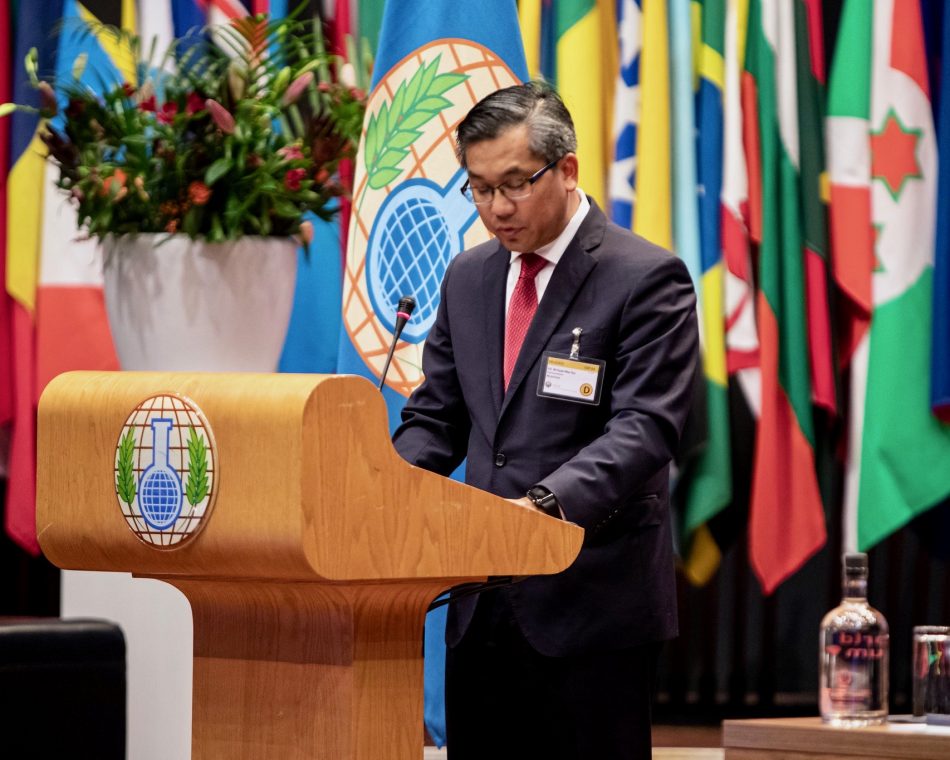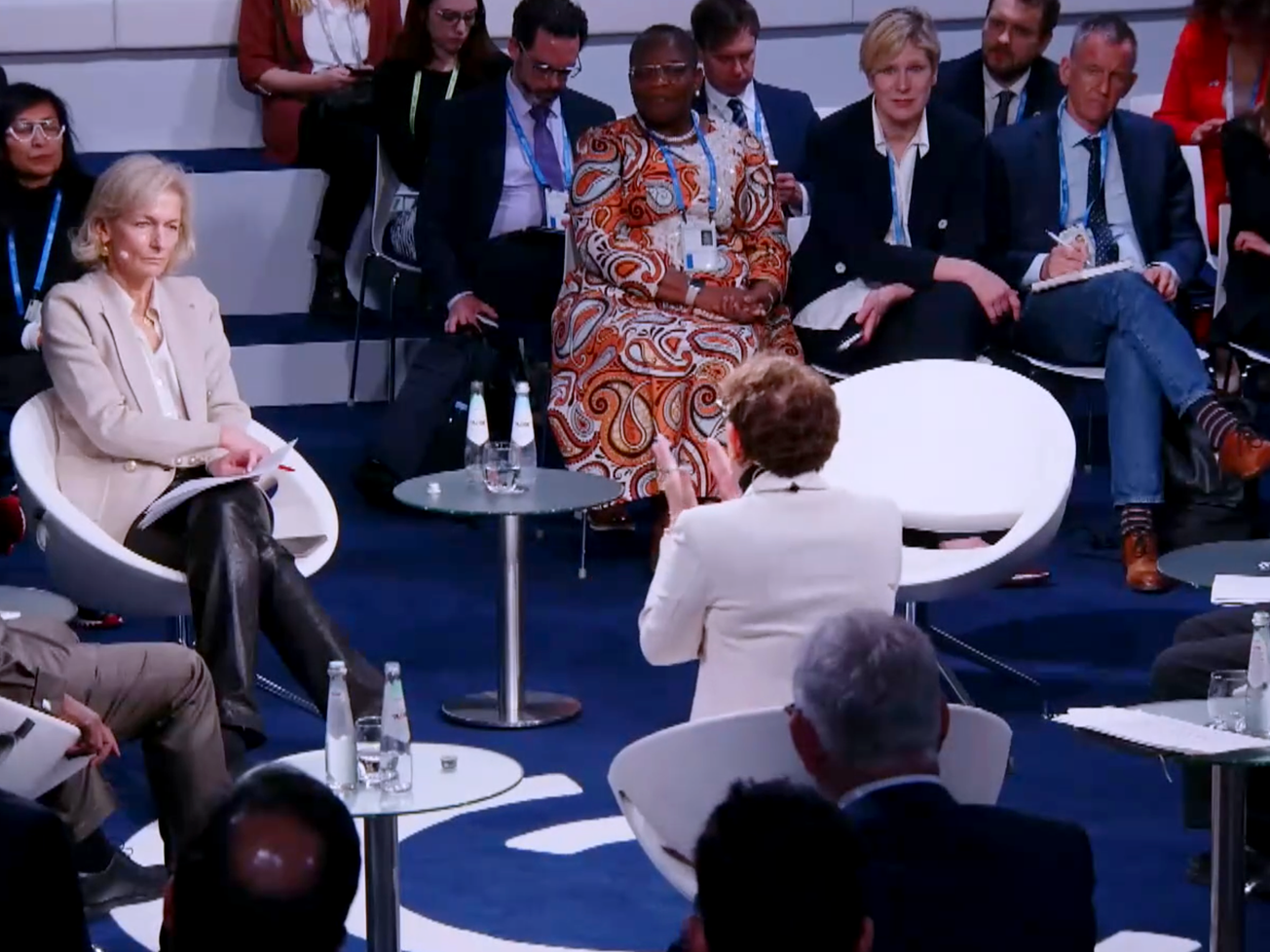UNITED NATIONS (AN) — A week after his nation's powerful military tried to remove him, Myanmar’s U.N. Ambassador Kyaw Moe Tun remained in his post due to the resignation of a military-appointed replacement, the chief U.N. spokesman said on Thursday.
Tun broke ranks with Myanmar's military generals and sided with elected civilian leaders in a speech to the U.N. General Assembly on February 26, when he called for the international community to "use any means necessary" to oppose the February 1 military coup.
A day after his speech, Tun was dismissed from his post. The nation's state-run Myanma Radio and Television announced Tun was no longer Myanmar's U.N. ambassador posted to the world body's headquarters in New York. The announcement said he "didn't follow the order and direction by the state and betrayed the country" while the military junta cracked down on nearly four weeks of mass protests against its overthrow of Myanmar's elected government.
"That is why he is revoked from his position starting from today," said Myanma Radio and Television, or MRTV, formerly known as the Burma Broadcasting Service. But it was not clear whether the generals who carried out the coup had the legal authority to dismiss Tun, since he was appointed to the U.N. post by the democratically elected heads of Myanmar's government in September 2020.
The military tried to replace Tun with his deputy, Tin Maung Naing. But Myanmar's U.N. mission in New York informed the world body that Naing submitted a resignation letter to Myanmar's foreign ministry and Tun "remains the permanent representative of Myanmar to the United Nations," Stéphane Dujarric, spokesperson for U.N. Secretary-General António Guterres, told a press briefing.
Noon briefing: updates on #Myanmar; @OCHA_Ethiopia; latest on COVAX vaccine rollout in Africa; @UNEP launches #FoodWasteIndex report, @UNDP launches report on a #TemporaryBasicIncome for women; @rajasingham_UN will brief on recent trip to #BurkinaFaso https://t.co/YDghrBCyDr
— UN Spokesperson (@UN_Spokesperson) March 4, 2021
'Crystal clear' opposition
Tun's surprise speech a week earlier, urging all nations to show public support for Aung San Suu Kyi’s ruling National League for Democracy party, elicited applause from diplomats to the 193-nation world body, including envoys from the European Union and Organization of Islamic Cooperation. He also held up three fingers, mimicking anti-coup protesters' gesture of defiance.
"People from all strata of life have come out on the streets all over the country and expressed their disappointment with the military coup as well as demanded the immediate release of all detainees and return of the state power to the people through the elected government. The people of Myanmar are resolute for achieving the demands," he said, adding he agreed with Guterres "that the military coup is not acceptable in this modern world and the coup must fail.”
Tun said Myanmar's citizens do not want to return to life under a military junta as it was from 1962 to 2011, when the nation was considered to be a pariah state. "It is crystal clear that we all do not want to go back to the system we used to be in before," he said. "At this important juncture, the continued and strong support from the international community is imperative for the people of Myanmar in our fight against the military regime."
The former junta changed the nation’s name to Myanmar, but Suu Kyi and many democracy supporters still called it Burma. She won the 1991 Nobel Peace prize for her nonviolent struggle for democracy after leading her party to victory in 1990 elections, but the military junta that led the government refused to recognize the results.
She spent much of the next two decades under house arrest but was freed in November 2010. Her party won a landslide victory in 2015 and Suu Kyi, who was technically barred from becoming president, took over as State Counselor, the nation's de facto leader.
Salute you H.E U Kyaw Moe Tun. You made a right decision today. I hope from now on you support human rights for Burma and expose the truth about the military to the world. #Burma #ThanksUKyawMoeTun pic.twitter.com/AFZ3fwN3X9
— Kyaw Win (@kyawwin78) February 26, 2021
Statement by Ambassador U Kyaw Moe Tun as representative of CRPH to the UN General Assembly#SupportCRPH #RejectMyanmarMilitaryCoup pic.twitter.com/Y5LY3UOwuV
— CRPH Myanmar (@CrphMyanmar) February 26, 2021
'Helpless' without international support
In his speech, Tun thanked Guterres and other United Nations officials who support Myanmar's democracy movement and oppose the military junta's efforts to suppress citizens by resorting to human rights violations and abuses.
However, Suu Kyi, once an icon of democracy and human rights, has also fallen in stature internationally by denying her nation’s military committed genocide against the Rohingya ethnic minority.
“The people of Myanmar still feel hopeless," Tun told the assembly, where physical attendance was scattered due to the pandemic. "We still need strongest possible action from the international community to immediately end the military coup, to stop oppressing the innocent people, to return the state power to the people, and to restore the democracy."
Newly sworn-in U.S. Ambassador to the U.N. Linda Thomas-Greenfield called Tun's speech "courageous and brave" and said President Joe Biden's administration supports the pro-democracy protesters turning out by the tens of thousands in Myanmar's main cities.
"Let me be clear from the outset: The United States continues to strongly condemn the military coup in Myanmar. And we condemn the security forces’ brutal killing of unarmed people," she said on Friday in her first speech to the assembly, a day after taking up her new post.
"The people of Myanmar are making their voices heard. Doctors and civil servants. Grocery store cashiers and milk tea servers. Delivery drivers, oil rig operators, and artists," Thomas-Greenfield said. "They are marching in the streets. They are raising red balloons, and banging pots and pans, and they are demanding their democracy back. We stand in solidarity with them."
The U.N. General Assembly had gathered for an informal briefing by videoconference from Guterres' special envoy for Myanmar, Christine Schraner Burgener, who also called on all nations to stand with Myanmar.
"I strongly condemn the recent steps taken by the military and urge all of you to collectively send a clear signal in support of democracy in Myanmar," Schraner Burgener said, noting her previous warnings about the military's complex role.
"I have tried again and again to explain the complex situation, namely that the army holds the real power," she said. "Three ministries were occupied by members of the army, and the police in particular were subordinate to it. Genuine democracy requires civilian control over the military."
Schraner Burgener, a Swiss diplomat, added that Myanmar's military has, in effect, "exploited differences to try to justify an attempted coup. I say 'attempted' since the takeover has not stabilized; it would appear to be roundly rejected by the people. It is important the international community does not lend legitimacy."







